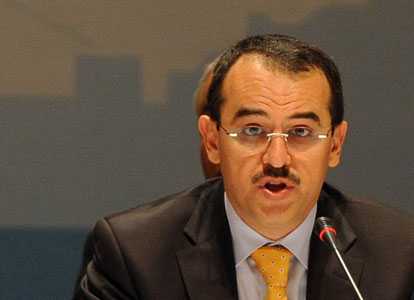ISTANBUL – Hürriyet Daily News

Modernization of the judiciary is an obligation rather than a bonus, Turkey’s justice minister says during the 30th Council of Europe Conference of Ministers of Justice in Istanbul, which tackled topics like modern, transparent and efficient justice; prison policy in contemporary Europe; and the protection of personal information in the third millennium
Turkish Justice Minister Sadullah Ergin. AA photo
Modernization of the judiciary is a necessity rather than a luxury, the Turkish justice minister said Thursday in Istanbul during a speech at the 30th Council of Europe, or CE, Conference of justice ministers.
“A judiciary that does not benefit from modern-age tools will become inefficient and inoperative, unsuccessful in the fight against crime and organized crime and will not be able to satisfy the expectations of society,” said Turkish Justice Minister Sadullah Ergin.
Modern, transparent and efficient justice, prison policy in contemporary Europe and the protection of personal information in the third millennium were the focal points of the conference, which was held this year in Istanbul on Nov. 25 and 26.
Modernization of the judiciary would not only end extremely lengthy judicial proceedings but also make the system more transparent to the public while providing a better footing for the debate of potential laws at the legislative level, according to Thomas Hammarberg, the CE commissioner for human rights.
Corruption is a serious threat to many CE member countries’ judicial systems, Hammarberg said.
“When money and politics are combined, the situation becomes even worse,” he said, adding that pressure on judges by organized crime networks also poses a serious threat to judicial independence.
“Judicial systems must be efficient enough to provide quality, independent decisions at a proper time,” said CE Deputy Secretary-General Maud de Boer-Buquicchio.
Furthermore, modern judiciaries must ensure a just and humane execution of court decisions, she said, adding that overcrowded prisons and disparities in prison conditions through all CE member countries were two issues that must be addressed urgently.
“Bad prison conditions and the limited provision of healthcare services in prisons are still persisting concerns [in CE countries],” Hammarberg said, adding that HIV has become a very serious problem in prisons throughout Europe.
The European Union has already established an e-justice system in the framework of the Stockholm program, which aims to help justice be administered more efficiently throughout the union, according to Belgian Minister of Justice Stefan de Clerck, who addressed the ministers on behalf of the Belgian EU Council presidency.
“There were about 10 million EU citizens involved in cross-border civil proceedings in the EU, according to a Commission’s 2008 report,” he said, adding that the Stockholm program provided tools designed to help citizens in such cases.
The EU must not duplicate prison policies
The EU should collaborate with the CE and become involved within already existing prison policies, rather than try to establish parallel policies at a community level, said Erol Aslan Cebeci, deputy chairman of the CE Parliamentary Assembly.
“We must stay vigilant,” he said, adding that the EU envisaged its own series of policies regarding prison and detention issues at community levels.
The duplication of this kind of activity must be avoided as it might lead to confusion, he said. “The EU must be part of the Council of Europe’s mechanisms [regarding prison and detention].”

Leave a Reply